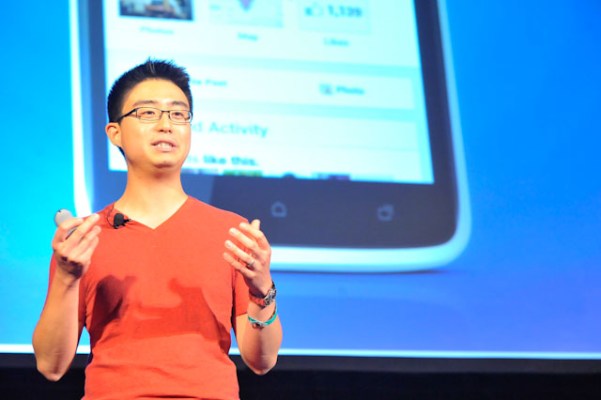Peter Deng of Facebook said on stage at the TechCrunch CrunchUp today that the company’s mission is now focused on mobile.
There is no single team that is focused on mobile, said Deng, Facebook’s director of product management. Instead, each group, be it the messaging or location teams, are thinking about mobile development.
It’s the right team that makes for great development, Deng said. By breaking the groups into small teams, Deng said developers can move quickly on the company’s design and social philosophies and better understand nuances of the experience they are seeking to convey in Facebook apps. It goes as far as Deng spending time thinking about seating arrangements so interactions between team members can be as efficient as possible.
Desktop app development is now moving toward twice daily pushes. Mobile development will also move toward a time based approach, operating on six-week schedules. The first four weeks are for development, test and iteration. The remaining two weeks are for quality checks and bug fixes. The hope is to get into a cadence for rapid new app and feature development.
Facebook’s Camera app was built by a team of four people. The first Messenger app was built by seven engineers with simultaneous development for the iOS and Android platforms.
Deng said apps are designed with three themes in mind:
Start with people: Technology should serve people, not the other way around. Facebook’s friendship model is built on the concept of two-way trust. It’s the basis for the Facebook friend request. Facebook is now seeking new ways to connect friends in serendipitous ways. It’s those unexpected connections that people make which Deng said provides real joy to Facebook teams. We are often connected in ways we do not know. Surfacing those connections provides a context that is core to the Facebook mission. Deng said capabilities such as GPS make it possible to connect people in the way that they want.
Design for stories: Facebook is inherently telling a story, Deng said. Stories are about remembering the past, helping us understand the present and building an identity of who we are. This is why Facebook exists. It is inherently a storytelling platform. He says with mobile, Facebook can provide the ultimate storytelling experience. The Camera app, for example, allows you to take photos wherever you may be. But that is not its value. Its value is in technically designing an app that provides a sharing experience. The Camera app embodies these concepts. For example, it allows you to see these huge photos that can be swept left or right on the device. That forms a connection with someone’s trusted community. It also allows for multiple photos to be uploaded to Facebook in a single post. Sharing those photos becomes a way of telling a story about an experience.
Connect authentically: Face to face communications carries a range of emotions. Facebook is seeking to bring more of those experiences into the mobile app experience. A text message conversation can pose a problem when people are arranging a time to meet. If a person is running late, their text may not be read by the recipient. In the Messenger app, Facebook is designing in features that are intended to do a better job of coordinating. If you are meeting someone, the Messenger app will tell you how far away the person is so you may adjust accordingly.
Deng says Facebook is on a new journey. But it feels like they are just realizing the importance of mobile and now are racing to catch up to a population that depends on their phones for the way they live and work.
